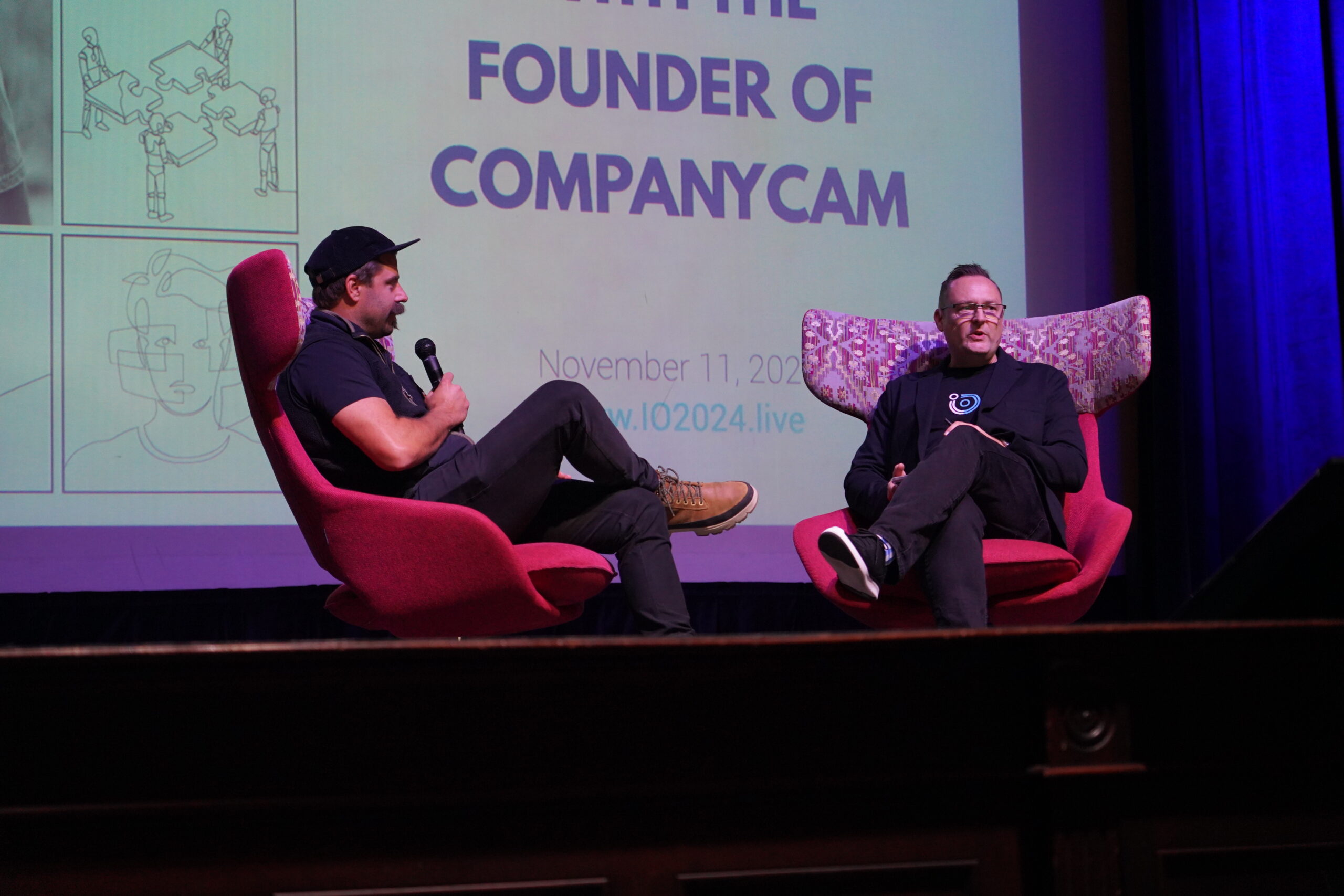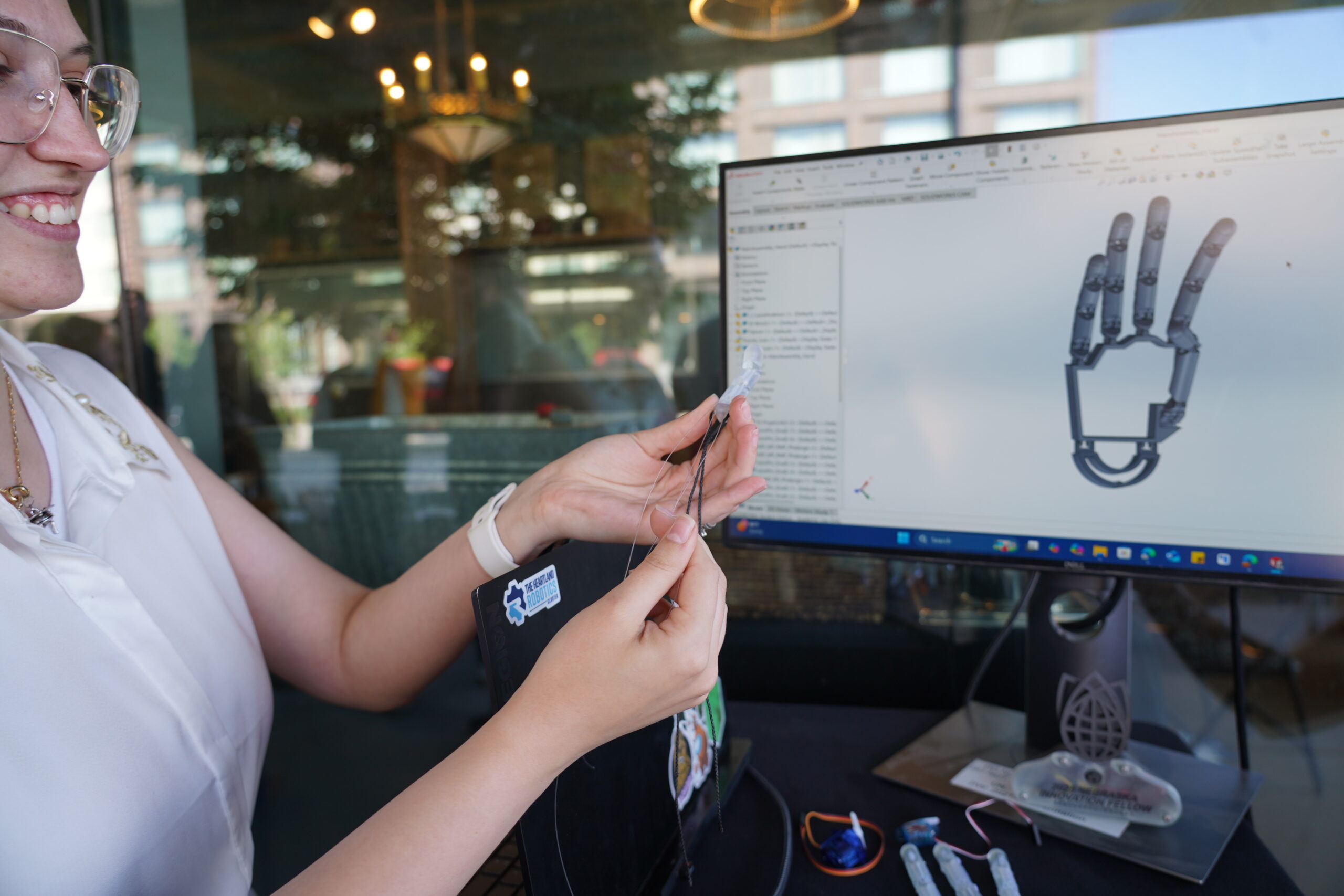
Sue Brothers presents her startup, Omni Symmetry, during the afternoon pitch session at Pipeline’s Innovator of the Year event.
 As he embarked on his presentation, the last of 10 given Thursday at Pipeline‘s Innovator of The Year (IOTY) pitch session at the Overland Park (Kan.) Convention Center, Michael O’Shaughnessy cracked wise about the disparate nature of his company, a marketplace for selling transferable tax credits, and the company that had presented just before, a social streaming music service.
As he embarked on his presentation, the last of 10 given Thursday at Pipeline‘s Innovator of The Year (IOTY) pitch session at the Overland Park (Kan.) Convention Center, Michael O’Shaughnessy cracked wise about the disparate nature of his company, a marketplace for selling transferable tax credits, and the company that had presented just before, a social streaming music service.
“We’re going to tone things down from the exciting world of music,” O’Shaughnessy said, “to the very exciting world of taxes.”
Similarly abrupt transitions abounded all day long. Pipeline, a Kansas-based fellowship for entrepreneurs with high-growth startups, brought together 10 innovators with diverse ideas at different stages of development for its 2011 class. After a year’s worth of modules, training and sharpening of their entrepreneurial skills, members of the 2011 class completed their final assignment by pitching before a room full of observers and panel of high-powered judges today.

As mentioned in an earlier post about Pipeline’s IOTY event, events like this provide a reminder that Silicon Prairie News has only just begun to shed light on some under-exposed pockets of entrepreneurs throughout the region. That is to say, we will write more stories and go into greater depth on several of these Pipeline entrepreneurs in the near future.
But, for now, here’s a rundown of the 10 businesses presented today by Pipeline’s 2011 innovators, and a look at some of the most quotable moments from those pitches.
SkillSniper
 Presented by Gary Hicks, founder and CEO
Presented by Gary Hicks, founder and CEO
Quick pitch: SkillSniper is a web-based platform designed to match companies looking to fill jobs in information technology, healthcare, engineering and business operations with the best candidates for those jobs. SkillSniper aims to do that faster than the competition by taking the focus off of résumés and putting it on specific job skills and years of experience.
Quotable: “What used to be a significant part of that environment with the jobs is now a significant problem,” Hicks said of online job-matching services that emphasize résumés. “What’s happening is employers are getting overloaded and flooded with résumés.”
ABPathfinder
Presented by Jeff Blackwood, co-founder, president and CEO
Quick pitch: ABPathfinder is a cloud-based service that aims to help therapy professionals, special educators and others that work with children who have autism. ABPathfidner is designed to eliminate paperwork and tailored to meet the needs of different therapy protocols, with the goal of making administrative tasks for its users more efficient and effective.
Quotable: Blackwood said ABPathfinder is unlike other solutions on the market because, whereas most solutions are built for use at a specific facility and then released for general use, ABPathfinder was designed from the outset for widespread use. Most of ABPathfinder’s competitors, Blackwood said, “haven’t built the system to be flexible.” Later in his presentation, Blackwood touched again on ABPathfinder’s adaptability. “We’re going to make this neutral,” he said. “We’ll just integrate with your current processes and be a workflow engine for you on the back-end.”
Cloud Sherpas
 Presented by Tim Lockyear, director of application development
Presented by Tim Lockyear, director of application development
Quick pitch: Cloud Sherpas is the world’s leading Google Apps cloud service provider. The company helps users migrate to Google Apps from their previous mail systems, aiming to help those users cut costs, increase productivity and streamline IT processes. (Lockyear joined the Cloud Sherpas team when a company he co-founded, Beloit Solutions Group, was acquired last June.)
Quotable: Judges asked Lockyear whether it was concerning that Google, plush with cash as it is, might simply decide to buy up companies like Cloud Sherpas if it so desired. “I think it’s kind of a calculated risk,” Lockyear said of being a Google Apps service provider, “because if you look at the evolution of Google as a company, they’ve made it pretty clear … Google believes (morphing into a service company), that’s not the route.”
Intellispeak’s e-locator
 Presented by Suman Saripalli, founder and president
Presented by Suman Saripalli, founder and president
Quick pitch: Saripalli presented e-locator, a tracking solution designed by Intellispeak. e-lactor helps caretakers of people who wander — often due to medical conditions like autism or Altzheimer’s disease — to track those people indoors and outdoors, in real time and independently. The system works by sending a continuous signal from a device in the shoe of person being tracked to the cell phone of the caregiver.
Quotable: Saripalli said some 3.2 million people in the United States have been diagnosed with a medical problems that leads to wandering, and his product cuts down on the anxiety and stress often associated with taking those people to public places. “E-locator, he said, “helps caregivers find the wanderers fast, independently.”
Pulse Aerospace
 Presented by Bill Donovan, co-founder and president
Presented by Bill Donovan, co-founder and president
Quick pitch: Pulse Aerospace designs, develops and delivers products and services related to Unmanned Aircraft Systems (UAS) for uses like surveillance by military entities, route scouting by overseas vessels and utility monitoring by energy companies.
Quotable: Donovan said his company is in an industry that’s ready to make the leap from a $5 billion industry to a $50 billion one but that a strategic approach to scaling is essential. “These systems have so many applications,” he said, “that our biggest challenge is to narrow our scope to focus on the customers we have now so that we can completely satisfy our customers.”

Kyle Johnson presents AudioAnywhere, a social, streaming music service, during the afternoon portion of the Pipeline IOTY pitch session.
Electronic Sensors
Presented by Gerald Rues, founder, president and CEO
Quick pitch: Electronic Sensors makes tools that monitor liquid levels in industrial-sized tanks — a business it’s been in for two-plus decades. The company is looking to grab a greater market share by devising a solution for eliminating inefficiencies in the liquid distribution process. It hopes to do that through the use of software tools that would collect the data from sensors and make that data available for analysis via a web-based interface.
Quotable: “There is not a single company out there that has taken this process and made it repeatable, easy to use, to where the distributors are flocking to it. It just doesn’t exist,” Rues said. “Well, we believe that Electronic Sensors and our solution is what the market’s looking for.”
JCB Laboratories
 Presented by Brian Williamson, president and CEO
Presented by Brian Williamson, president and CEO
Quick pitch: JCB Laboratories provides sterile compounded solutions (a type of pharmaceutical product) by working with clients to formulate products that have unique qualities specific to their individual needs, whether that means preservative-free products, products in various strengths and sizes or products that are otherwise unavailable. JCB aims to circumvent many of the costs of bringing a pharmaceutical to market and hold itself to standards higher than industry regulations dictate as it prepares sterile products for individual patients, physicians, veterinarians, surgery centers, hospitals and clinics.
Quotable: Asked by the judges about whether he possessed the business expertise to bring the capital and other factors necessary to help his company scale in a hurry, Williamson didn’t flinch. “Look, I’m a pharmacist. I make drugs,” he said. “But I surround myself with people smarter than I am. … I have the leadership and the vision to bring those type of people in.”
Omni Symmetry
Presented by Sue Brothers, chief operating officer
Quick pitch: Omni Symmetry is a group communication application for mobile phones that enables users to establish separate groups of people from different key communities and organizations in their lives and invite members to join. In doing so, Omni Symmetry aims to help users take the hassle out of contact list maintenance and control what information about themselves their contacts can access.
Quotable: Brothers said Omni Symmetry is based in part on the belief that communication conveyed on a recipient’s terms is important to people. “People want to control how they’re seen and by whom. What’s most important to them is how people perceive them,” she said. She continued, touching on people’s desire to project customizable personas. “I want to be fun and casual to my friends but professional to a business associate.”
AudioAnywhere
Presented by Kyle Johnson, founder and CEO
Quick pitch: AudioAnywhere is out to save the music industry. A web-based, social, streaming music service that’s designed to work in tandem with an ad platform — also produced by the AudioAnywhere team — to monetize online music, AudioAnywhere uses low-cost, targeted advertising to help make a small profit on every song played.
Quotable: Johnson painted a picture of bleak situation the music industry is facing on account of letting people stream music without a model for monetizing that. “Free is the music industry’s F-word,” Johnson said. He continued: “Pandora loses money. Spotify loses a ton of money — about $4 million a month. We have the solution.”
Baxi Tax Credit Exchange
Presented by Michael O’Shaughnessy, president and general counsel
Quick pitch: Baxi is an online marketplace for buying and selling transferable tax credits of all kinds. Baxi helps buyers and sellers of the credits find each other in a more efficient manner, functioning, O’Shaugnessy said, “like the eBay of state transferable tax credits.”
Quotable: O’Shaugnessy said a lack of transparency and awareness of options regarding tax credits often leads to people familiar with the rules of tax credits gaming the system for healthy profits while the people intended to benefit from the credits don’t realize their full value. “We bring together the buyers and sellers of tax credits so that there’s fewer middle men involved,” he said.

Members of Pipeline’s 2012 class of innovators take in the presentations by members of the organization’s 2011 class.
Image credits: Photos by Michael Stacy.







